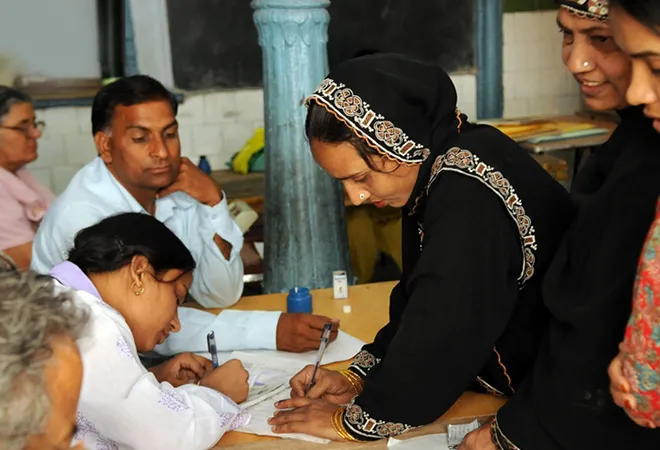Around the world, states have used elections as a marker of legitimacy. In conflict areas, the conduct of free and fair elections is considered crucial in the quest for stability. In the case of Jammu and Kashmir, the election process has been closely intertwined with the security situation; and the due Panchayat elections have once again raised the question about whether the government will be able to harmonise the two in the current environment. The 2014 Elections to the J&K Legislative Assembly were held against the backdrop of a decline in incidents of terrorism and violence. The
high voter turnout, despite a near unanimous call for a
boycott by the separatist leadership, was cited by many as proof of the Kashmiri populace’s willingness to be a part of the Indian Constitutional setup.
By 2017, however, the situation seems to have completely turned around. The by-election to the Srinagar Lok Sabha Constituency was held in the context of increasing terrorist attacks and stone pelting violence. Despite a heavy deployment of security forces, this election saw over 200 incidents of violent protests, including attacks on poll stations which resulted in the
death of 8 people. The voter
turnout of 7.13% was the lowest in 30 years. The violence also prompted the
cancellation of the election in the Anantnag by-election, and the seat has remained vacant since April 2017. In sharp contrast to 2014, the low voter turnout and cancellation in 2017 by-election was seen by many as a victory for the separatists. Moreover, it would be a cause of concern for New Delhi as it could cast aspersions on the Kashmiri population's acceptability of the electoral process.
The Election commission in its
order stated various reasons for the indefinite deferring of the by-election to the Anantnag Lok Sabha constituency. While law and order was discussed in great detail and
many have cited it as the major reason, the EC also considered the unavailability of the requested Central Paramilitary Forces, and the apprehension that the electoral process would disrupt life during the month of Ramzan, Amarnath Yatra and the tourist season. Meanwhile, opposition parties like the
National Conference have alleged that the election was canceled as the ruling PDP feared the defeat of its candidate. Reports like those in the
Open Magazine, quote a senior police officer saying that the Anantnag by-election was canceled despite the police’s advice “not to do so”. This only adds weight to the allegations leveled by the Opposition in this matter.
As Anantnag Lok Sabha constituency represents South Kashmir, considered the
bastion of the PDP, ,a defeat of their candidate would surely be a setback. The fact that the PDP candidate, Tassaduq Mufti, is the brother to the current Chief Minister and previous incumbent of the seat Mehbooba Mufti, would only serve to be a matter of further embarrassment for the party. In these conditions, a defeat would also raise questions about what remains of the popular mandate that the PDP had claimed in Kashmir with the results of the 2014 Assembly elections. Having won all three of the Kashmir based constituencies in the Lok Sabha, its defeat in the Srinagar by-election and effective cancellation of the one in Anantnag leaves the party able to stake claim to only one of the three Lok Sabha . Considering the fact that
18 out of PDP’s total 28 seats in the J&K Assembly come from the two Lok Sabha constituencies the PDP has been forced to vacate, this should be a cause of worry for the party as it shows a dramatic decline in their popularity. This, along with the deteriorating security situation in the valley only add weight to the voices, such as that of National Conference leader
Farooq Abdullah, that call for Governor’s rule to be imposed in J&K.
It is in this environment that the upcoming Panchayat polls will act as the pressing challenge to the state apparatus in J&K. Despite claims coming from various quarters of the government that
‘normalcy’ has returned to the valley; frequent outburst of violence in the form of terrorist attacks, encounters, and clashes with civilian population do not allow for much confidence in such contentions. Such claims also run contrary to the stated position that it is the prevailing security situation that did not allow for the
Lok Sabha by-polls to be held; and are now preventing the state from scheduling the
Panchayat elections. Such contradictory assertions however lead to the inference that the ‘new normal’ in Kashmir is one where the state is unable to conduct popular and peaceful elections.
Despite the
Hurriyat’s call for a boycott and the threat of violence by terrorist outfits like the
Hizbul Mujahideen, the Panchayat elections also present the State Government with an opportunity to bring peace to the valley.
The last Panchayat elections in 2011 were also held in the backdrop .3. of an agitation which brought thousands of protestors on the streets. However, the Panchayat polls held in early 2011, turned out to be a resounding success with a
voter turnout of over 80%. They were followed by five years of stability. The government needs to examine exactly how the 2011 polls emerged as a success against heavy odds. It must endeavour to achieve a similar effect and use the Panchayat elections as an opportunity to bring about peace. Otherwise it runs the risk of allowing the separatists to claim another victory in 2018.
The views expressed above belong to the author(s). ORF research and analyses now available on Telegram! Click here to access our curated content — blogs, longforms and interviews.




 PREV
PREV


